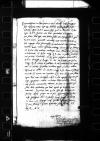Letter #1001
Stanisław KOSTKA to Ioannes DANTISCUSMarienburg (Malbork), 1533-09-04
| received [1533]-09-07 Manuscript sources:
Auxiliary sources:
Prints:
| ||||||||
Text & apparatus & commentaryPlain textText & commentaryText & apparatus
Reverendissimo in Christo patri et domino, domino
Reverendissime in Christo pater et domine, domine mihi gratiosissime. Post obsequiorum meorum erga Reverendissimam Dominationem Vestram indefessam promptitudinem.
Optat Reverendissima Dominatio Vestra certior fieri, quomodo in donationem sacrae maiestatis regiae Reverendissimae Dominationi Vestrae factam cum dominis exactoribus convenerim, quo sciret maiestati regiae aut habere gratias aut conqueri. Nolo igitur Reverendissimam Dominationem Vestram latere, quomodo nonnullis ante exactis diebus in his negotiis dominus Plemenszky contributionum terrae Culmensis exactor, unus mecum conferebat aiebatque sacrae maiestatis regiae litteras, ab Reverendissima Dominatione Vestra illis traditas, intellexisse, quomodo maiestas sacra regia pecunias contributionis ab Reverendissima Dominatione Vestra eiusque Reverendissimae Dominationis clero et subditis provenientes, eas pecunias contributionis ob per ignem perpessam calamitatem Reverendissimae Dominationi Vestrae dimisisse et donasse et ideo eis praecepisse Reverendissimam Dominationem Vestram eiusque Reverendissimae Dominationis clerum et subditos de tali contributione non inquietare et monere, in quibus mandatis regiis se velint reddere conformes et oboedire, et Reverendissimam Dominationem Vestram eiusque Reverendissimae Dominationis clerum et subditos am{m}odo non monere aut inquietare. Cum vero sacra sua maiestas regia, dominus meus clementissimus, nihil in his negotiis dignata est mihi significare, nedum in dictorum dominorum exactorum litteris mei fecerit mentionem, arbitror non licere in negotium, quod solis dominis exactoribus per litteras regias est commissum, me intromitti. In quibus vero Reverendissimae Dominationi Vestrae praesto esse decuerit et poterim obsequi, semper ero et sum obsequentissimus Reverendissimae Dominationi Vestrae, mihi gratiosissimo domino et fautori, cuius gratiae et favori me una cum obsequiis meis humillime recommitto.
Datum ex
Eiusdem Reverendissimae Dominationi Vestrae obsequentissimus

